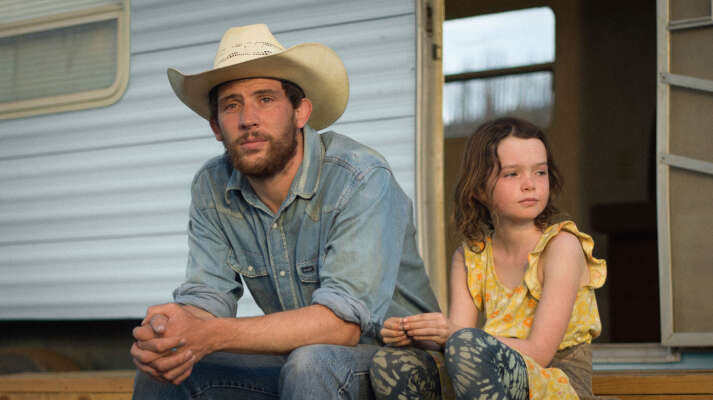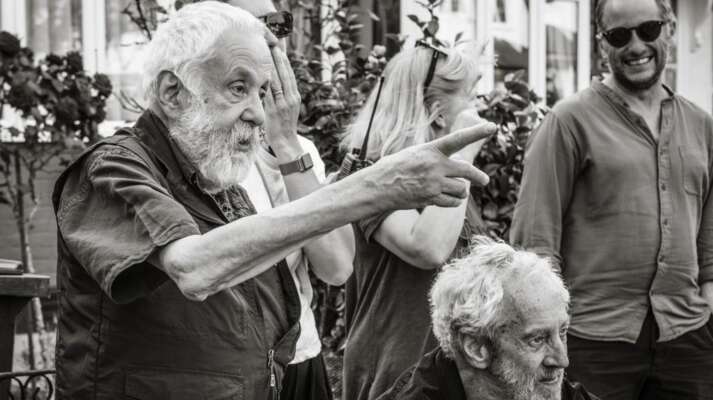Helen Mirren
A Commanding Performance
Helen Mirren
Written by Peter Bowen
In EYE IN THE SKY, Helen Mirren plays Colonel Katherine Powell, a UK officer tracking a British-citizen-turned-terrorist in Kenya with the help of US drone surveillance. When new information suddenly transforms this observe-and-capture action into something much more dangerous and pressing, Mirren is the woman who must step up to make the hard decisions. As a modern military leader, Powell is required to negotiate not only the high-tech matrix of directing drone strikes being flown by pilots stationed in Nevada, but also the complicated legal, political, and public relations repercussions of her operation. For director Gavin Hood, Mirren was the person to capture this complex character. “She’s ferocious, determined, highly intelligent, and completely grounded,” remarks Hood. “She has real acting chops and the grit you need to play this character.” For the part, Mirren consulted with military figures to learn about her “character’s trajectory by talking about the kinds of experiences she must have had and the things she would have overcome as a woman in the military.” She came to understand the enormous pressure a commander like Powell must face. “You have to make decisions and you have to make them fast. You can’t shilly-shally,” Mirren notes. “In the thick of a battle like Black Hawk Down, you don’t have time to go, ‘Are we legally allowed to do this?’ because you have to think on your feet.” But for her character, Mirren could also review her own remarkable resume playing powerful women. Indeed, The Times notes how her performance sums up a career of commanding characters: “If we ever needed proof that Helen Mirren is not just magisterial, but has balls of steel, EYE IN THE SKYis the clincher.” In the following, we look back at some of Mirren’s other commanding performances.

TRUMBO | An Actress with Character
In TRUMBO, Jay Roach’s historic drama about the blacklisted screenwriter Dalton Trumbo, Helen Mirren plays Hedda Hopper, the fancy-hatted gossip queen of Hollywood. “How interesting Hollywood was at that time,” Mirren exclaims. “Hollywood was an extraordinary construct, fed by publicity, by the Hedda Hoppers and the Walter Winchells of the world, by the publicity agents and by the studios.” More than just a gossip, Hopper used her well-read column as a bully pulpit to promote her right-wing politics and decry the communists in Hollywood. She was particularly virulent about the Hollywood Ten, hounding them in print long after they left prison. Hopper reserved a particular animus towards Trumbo, calling him out as a “commie” even after he received a screen credit on Spartacus. As calculating, even cruel, as Mirren’s Hopper appears in TRUMBO, she is never two-dimensional. As Salon points out, “Mirren plays Hopper’s unctuous self-righteousness beautifully.” In many ways, she is a ferociously determined woman fighting to make the male Hollywood machinery work for her. As with her other great roles, Mirren makes Hopper a fascinatingly complex character whose larger-than-life personality commands our attention. “She's such a powerful, interesting influence—at a time when women weren't allowed a lot of power,” Mirren tells The Hollywood Reporter. “Between her and Louella Parsons [syndicated columnist of the Los Angeles Examiner], the two of them worked their way into becoming extremely powerful movers and shakers. They could make or break a movie. Or a career.” Both the Golden Globes and the Screen Actors Guild rewarded her remarkable performance with supporting actress nominations.
 Prime Suspect | On The Case
Prime Suspect | On The Case
In 1991, Helen Mirren, who’d earned a reputation as one of Britain’s best and brashest Shakespearian actors, garnered international attention when she stepped onto the small screen as Detective Chief Inspector Jane Tennison in the British police procedural Prime Suspect. The show’s creator, Lynda La Plante, originally thought of Mirren for the role. “When all six episodes of the first series were written and I was asked who I'd like to play Jane, I suggested Helen, whose work I'd admired in the theatre.” For La Plante, Mirren had “a certain steel, a gravitas about her, which absolutely suited the role.” While Mirren had never done a cop show, she understood human nature. “This is the first time I've played a policewoman, but I wouldn't say it's the first time I've played a character like her,” Mirren remarked. “In fact the character that I have played that is closest to her is Lady Macbeth!” Indeed, Mirren raised the beleaguered female detective to a Shakespearean level. “She is driven, obsessive, vulnerable, unpleasantly egotistical, and confused,” Mirren told The New Yorker. “But she is damn good at what she does and is totally dedicated.” Mirren’s Tennison fights just as hard to discover the truth behind a series of gruesome murders as she does to hold her ground in a male-dominated police department. For audiences of the show––which aired in Britain before being imported to America six months later––Mirren’s performance was a revelation. The British tabloid The Sun proclaimed that Prime Suspect was “one of those of those rare shows that hook the nation: a TV event. Thousands must have postponed Monday night plans to follow this brutal murder case which swept you along with its driving pace.” The show returned irregularly every few years with a new case until the seventh and final Prime Suspect in 2006 revealed Tennison as an aging, alcoholic detective still struggling to find her place in a changing police force. As worn and weary as her character had become, Mirren’s Tennison also had deepened emotionally into one of TV’s most enduring and complex figures. For her performances in Prime Suspect, Mirren was nominated for six Emmys, winning “Outstanding Actress – Miniseries or Special” three times, including one for her exit turn in Prime Suspect: The Final Act. The San Francisco Chronicle’s Tim Goodman said of Mirren's swansong that there was “no escaping that the end is here, not just for Tennison, but for a favorite television character and a miniseries that took television to new heights.”
 Gosford Park | Solving the Mystery
Gosford Park | Solving the Mystery
In Gosford Park, Robert Altman’s 2001 rambling mystery set in an old English manor, Helen Mirren stars as Mrs. Wilson, the stern housekeeper who oversees the aristocratic family and their distinguished guests for a weekend of hunting, dining and murder. To create this world, Altman and his producer Bob Balaban reached out to Julian Fellowes, a British actor/writer who actually was to the manor born, to instill the story with a veneer of aristocratic veracity. (Fellowes would revisit this world for a more prolonged stay with his TV series Downton Abbey). The upstairs/downstairs mystery sported a who’s who of British acting aristocracy, including four figures with actual titles: Sir Michael Gambon, Sir Derek Jacobi, Dame Maggie Smith, and Dame Eileen Atkins. Other un-knighted cast members included Alan Bates, Stephen Fry, Jeremy Northam, Clive Owen, Ryan Phillippe, and Emily Watson. In the spirit of the Agatha Christie cozy murder mystery that the story pays homage to, Gosford Park features a fixed cast in which there are neither stars, nor extras––only suspects. As such, the cast stepped out of the way to let the story and setting shine. The Telegraphrecounts Altman’s impression of Mirren during production. “She told me I should simply cut one of the scenes she was in, because it didn’t add anything dramatically…Now can you imagine an American actor telling me that? To cut their precious scene?” As a housekeeper who blankly utters, “I'm the perfect servant. I have no life,” fading into the background was Mirren’s character Mrs. Wilson’s modus operandi. But as an actress, Mirren’s talent couldn’t help but shine through. In Slate, David Edelstein wrote, “Mirren has won—and will win—all kinds of awards for this role, for the very good reason that her wrenching final scene makes sense of every disapproving glance and tight inflection that has preceded it. No superlatives of mine can do her justice: You must see this performance.” While all the actors won the Screen Actors Guild (SAG) “Outstanding Performance by the Cast of a Motion Picture”, Mirren won the SAG award for Supporting Actress, and was nominated for an Oscar and Golden Globe as well.
 The Queen | A Crowning Achievement
The Queen | A Crowning Achievement
When Grenada Television conceived of a historical tale dramatizing the effect that Princess Diana’s death in 1997 had on the royal family and British public, there was really only one actress they imagined for the role of Queen Elizabeth II. Producer Andy Harries, who’d worked with Helen Mirren previously on the Prime Suspect series, immediately recognized the likeness between the actress and the monarch. “She’s just like the Queen,” Harries told Cineuropa. “People adore her, and she also looks like the Queen!" Throughout her career, Mirren has demonstrated a real affinity for embodying royal characters. She played—and was nominated for an Oscar for her role as––Queen Charlotte in the 1995 The Madness of King George, and took on the title character in the 2005 mini-series Elizabeth I (for which she won a Golden Globe and Emmy). But there is a big difference between playing a costumed lady and a living person connected to a national tragedy less than a decade old. As director Stephen Frears told the New York Times, “you’re not only dealing with your responsibility toward her but everyone in the audience has very strong feelings and knows a lot about her.” To get the character right, Mirren read biographies, pored over news accounts, and watched endless news footage of Queen Elizabeth II, from black-and-white newsreels of her as a little girl to recent television footage. While Mirren certainly came to acknowledge her humanity, she also recognized something the two women shared, telling The New Yorker, “I admire her as an actress.” When the film came out, Queen Elizabeth II returned the compliment, praising Mirren’s performance and inviting her to Buckingham Palace for dinner. The Queen was not alone in her praise, with scores of critics lauding Mirren’s performance. “Helen Mirren inhabits the role of Queen Elizabeth so thoroughly that her transformation astounds,” exclaimed USA Today’s Claudia Puig. “A lesser actress might have been able to pull off the ceremonial persona, but to portray the Queen as multidimensional and human, as Mirren does, projecting steely determination along with vulnerability and confusion, is a masterful accomplishment. Hand her the Oscar now.” Despite Puig’s insistence, it took a few more months for Mirren to receive her Academy Award, as well as a Golden Globe, a BAFTA, and a SAG award for her performance.
 RED | Going Rogue
RED | Going Rogue
In 2010, Helen Mirren expanded her acting range by picking up an Uzi for the thriller RED. Inspired by Warren Ellis and Cully Hamner’s comic book of the same name, Robert Schwentke’s action film cast Helen Mirren as a British operative among other RED––“Retired and Extremely Dangerous”––agents, including Bruce Willis, Morgan Freeman and John Malkovich. Mirren, who had gained her reputation playing literary and cultured roles, was attracted to the fun of doing something completely different. As she told Collider.com, “It was not The Queen. The appeal was Bruce Willis, an evening dress and a machine gun.” For many, that alone was worth the price of admission. “If you're like me, you'll put up with a lot of malarkey in a movie just to see Helen Mirren wielding a semiautomatic weapon,” Christian Science Monitor critic Peter Rainer quipped. “You may argue that Helen Mirren wielding a semiautomatic weapon is also malarkey. Maybe so, but malarkey doesn't get any better.” While Mirren certainly excelled in her evening gown-wearing, machinegun-toting role, guns were really not the point for her. “I find guns in civilian life so horrific, so dangerous, so destructive,” Mirren admitted to the Financial Times. “But I knew going into this film that we were all going to be using guns. I thought a lot about the violence, but then I decided to do it anyway, because I thought it was a smart movie.” One of its smarter points was the way the story and its characters comically challenged audiences’ attitudes about gender and age. “I would just say that, as an older person, you bring a different energy to the piece, and maybe it’s the energy of wisdom and experience,” Mirren told an audience in Comic-Con. For her role in RED, as well as The Debt, Helen Mirren received the “Actress Defying Age and Ageism” award from the Alliance of Women Film Journalists in 2010 and 2011, respectively.


